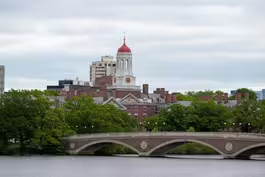
Brooks and Capehart on Trump's legislative agenda
Clip: 5/23/2025 | 10m 39sVideo has Closed Captions
Brooks and Capehart on House Republicans passing Trump's legislative agenda
New York Times columnist David Brooks and Washington Post associate editor Jonathan Capehart join Geoff Bennett to discuss the week in politics, including House Republicans pass President Trump's budget plan, the administration’s latest move against Harvard University and Trump's meeting with South Africa's president.
Problems playing video? | Closed Captioning Feedback
Problems playing video? | Closed Captioning Feedback
Major corporate funding for the PBS News Hour is provided by BDO, BNSF, Consumer Cellular, American Cruise Lines, and Raymond James. Funding for the PBS NewsHour Weekend is provided by...

Brooks and Capehart on Trump's legislative agenda
Clip: 5/23/2025 | 10m 39sVideo has Closed Captions
New York Times columnist David Brooks and Washington Post associate editor Jonathan Capehart join Geoff Bennett to discuss the week in politics, including House Republicans pass President Trump's budget plan, the administration’s latest move against Harvard University and Trump's meeting with South Africa's president.
Problems playing video? | Closed Captioning Feedback
How to Watch PBS News Hour
PBS News Hour is available to stream on pbs.org and the free PBS App, available on iPhone, Apple TV, Android TV, Android smartphones, Amazon Fire TV, Amazon Fire Tablet, Roku, Samsung Smart TV, and Vizio.
Providing Support for PBS.org
Learn Moreabout PBS online sponsorshipGEOFF BENNETT: From the Trump administration's latest move against Harvard University to House Republicans narrowly passing their massive spending and tax cut bill, lots to discuss tonight with Brooks and Capehart.
That is New York Times columnist David Brooks, and Jonathan Capehart, associate editor for The Washington Post.
Welcome, gentlemen.
GEOFF BENNETT: So.
House Republicans this week managed to pass their version of President Trump's legislative agenda, a massive bill that passed by one vote.
Jonathan, this bill extends the Trump tax cuts, but to pay for them, it cuts Medicaid, it slashes food stamps, it rolls back the Biden clean energy agenda.
What does this bill say about Republican priorities?
JONATHAN CAPEHART: Well, when Nancy Pelosi was speaker of the House, she has two favorite sayings.
One involves Lincoln.
The other one is, show me your budget and I will show you your priorities.
And what this budget shows is that Republicans are hell-bent on financing tax cuts for the upper income at the expense of middle-class, working-class and poor Americans.
And it's something that Republicans -- House Republicans are going to have to explain to their constituents, because if you look over on the Senate side, particularly I saw a clip of Senator Ron Johnson of Wisconsin, no liberal at all, railing against the deficit impacts of what the House has passed.
GEOFF BENNETT: The deficit impacts and the Medicaid cuts in particular.
That's tricky politics for Republicans because there are now so many more people on Medicaid.
Over the past eight years, Medicaid enrollment has surged to a record high and more red states have skin in the game, more Trump supporters.
How do you see this playing out?
DAVID BROOKS: Yes, and a lot of those rural hospitals really demand that.
And if they shut down, there's not a lot of options out there.
As this thing was going on, I was thinking of Warren G. Harding and Calvin Coolidge, as I often do... (LAUGHTER) DAVID BROOKS: ... with a frisson of pleasure.
But starting there like 100 years ago, and the Republican Party stood for fiscal discipline.
Like, it was in their bones.
And you don't have to go back too long to get to the Tea Party movement.
And this bill will add to the deficit -- or to the national debt by $3 trillion, $4 trillion?
Mind-boggling.
This is already at a moment when we are paying more interest -- on interest in the national debt, paying more to the bondholders than the entire defense budget.
And so you can run deficits when your interest rates are zero.
But when your interest rates get higher, it gets ruinously expensive.
And then when your interest rates are above your growth rates, that's a recipe for national decline, because you're building up debt and cost faster than your economy is generating wealth.
And so we're at a moment of true national peril.
Nations decline for a lot of reasons.
They lose wars.
But they do decline because they get swallowed up and buried in their own debt.
And it's so mind-boggling to me that the Republican Party of Warren G. Harding and Calvin Coolidge is the author of this.
GEOFF BENNETT: Is there an opening here for Democrats, especially on the health care and the Medicaid cuts?
Because that's a playbook that Democrats know.
That's how they won back the House in 2018, really going after Republicans who tried to roll back the Affordable Care Act.
JONATHAN CAPEHART: Oh, absolutely.
It'd be malpractice if Democrats weren't already running against Republicans, vulnerable Republicans.
Look, the president and the speaker made vulnerable Republicans cast a really bad vote for a bill that, sure, it passed the House, but is going to go to the Senate and is going to come back to them completely unrecognizable, thus giving Democrats all the material they need to hammer away at those House Republicans.
And I'm being very specific here.
I'm talking about House Republicans, but -- because the Senate Republicans, at least the ones I have been watching, are closer to the Harding Republicans you're talking about, David.
GEOFF BENNETT: Well, let's shift our focus here and talk about Donald Trump's fight with Harvard University, because, yesterday, the Trump administration, as you both know, took the extraordinary step of blocking international students from attending Harvard.
This afternoon, the school filed a federal lawsuit accusing the administration of waging a campaign of retribution, and a judge has quickly blocked the move.
David, the Trump administration is really trying to hit Harvard where it hurts, because foreign students typically pay full freight, and that in many ways subsidizes the tuition of American students.
It really is trying to go after the ability of Harvard to operate.
DAVID BROOKS: Yes, it's an attempt out of spite to destroy Harvard.
Now, I have my beefs, like all of us do, with Harvard.
I used to go.
There's a bookstore called the Coop in Harvard Square.
And I used to go there, and there's a section where the Harvard faculty had their books.
And I used to thrill to this section.
I shouldn't admit this on TV, but like Sam Huntington, E.O.
Wilson, Skip Gates, Helen Vendler, all these legendary scholars.
And you would think Harvard is the greatest university ever.
And over the last couple years, that section of the bookstore has gotten more boring because of progressive orthodoxy has had a smothering effect on the intellectual vibrancy of the place.
So I have my criticism of Harvard.
It still remains one of the greatest universities in the history of the world, where they do amazing scientific research, amazing humanistic research.
So you have got to behold the belief that, if you're like me, yes, the place has some serious flaws on antisemitism and on excessive progressivism.
But does that mean it's not one of them are most wonderful, valuable institutions and that you're destroying a large part of American wealth creation, American civilization when you take it down?
And these are the kinds of distinctions that the Trump administration simply can't make.
And I may have said this before, but it's like you go to the Trump administration like it's a doctor saying, I have acne, and the Trump administration says, OK, we will do decapitation.
And they think that's a cure.
And that's what's happened here.
It's a spiteful, incredibly destructive act.
GEOFF BENNETT: And this fight combines two of Trump's major themes, immigration and culture wars.
I mean, how do you see this playing out?
JONATHAN CAPEHART: The thing that I appreciate most about this is that Harvard is not backing down.
And one of the reasons why the president is going after Harvard is because Harvard had the temerity to say no.
When that letter came with all the demands that the administration later said was accidentally sent to Harvard, Harvard immediately said, we're not doing this.
We're not acceding to your demands.
And this came after Columbia University did the exact opposite.
And what Harvard did was -- I remember we talked about it after it happened, that what Harvard did, because of all the things that David said, the stature of Harvard, Harvard gave all those other colleges and universities that were looking for leadership at a time when they were under intense assault from the president of the United States, gave them a beacon.
And the fact that Harvard keeps going back and fighting back, it's fighting for itself as a university, but it is also fighting for academic freedom and the freedom of universities to teach the next generation of not just students, but of leaders.
GEOFF BENNETT: The other story I want to talk about before we wind up our conversation here is President Trump's meeting in the Oval Office with South Africa's president.
In what many people described as an ambush, the president, as you see there, he used misrepresented images to support false claims of white genocide in South Africa, really the latest data point in Trump's history with race and white grievance.
How did this meeting strike you and President Trump's overall message?
DAVID BROOKS: Two obvious things.
Donald Trump seems to be hostile to all immigrants, unless your ancestors created apartheid.
And so the racial element, it's pretty obvious.
The second thing, not quite as appalling, but coming in a close second, is how dishonest, how detached from reality the charge is.
I looked into it.
I looked through the crime statistics in South Africa.
I looked.
It took me like half-an-hour of Internet searching of finding credible authorities who are experts on this field, like, is there genocide, is there ethnic attacks?
And there's a lot of crime in South Africa.
There are 27,000 murders there.
It's a violent, dangerous place.
Is there evidence that people are targeted because of their ethnicity or skin color?
Not really.
And all you have to do is have some mope in the White House do 15 minutes of Googling.
But the administration just does not care about some basic loyalty to maybe we should see what's really going on there.
And so that's detachment for reality.
GEOFF BENNETT: Jonathan.
JONATHAN CAPEHART: The White House - - I'm sorry -- the Oval Office has become a Venus flytrap.
You walk into the Oval Office, you might not get out alive.
We saw that happen to President Zelenskyy.
He got mauled in the Oval Office.
We even saw Governor Gretchen Whitmer, when she was called into the Oval Office and ended up hiding her face behind, trying to, behind file folders because she was caught in there.
And now you have got the president of South Africa sitting with a president and delicately trying to fact-check him, and doing a little joke about, I wish we had a plane to offer you, and he said, yes, great.
I mean, I wish you did too.
I mean, that place is not a -- the Oval Office is no longer a serious place of business.
Leaders go in there.
And now I watch to see, how is the president going to humiliate this person in the most unserious way possible, while at the same time lending credence to already debunked racist theories?
And I am glad you pointed out the fact that this president has a long history of racist comments, racist actions, and peddling white grievance.
And he has a problem with immigrants, as long as they don't come from -- quote, unquote -- "S-hole countries."
And usually those countries that he defines that way are not white.
GEOFF BENNETT: I mean, what are the implications, David, if what used to be a coveted invitation to the Oval Office is now viewed by world leaders, to use Jonathan's phrase, a Venus flytrap?
DAVID BROOKS: Well, they all understand that he has all the power, because the U.S. needs them less than they need the U.S. And so it's a perfect situation for a bully, and they should have to walk in there saying, OK, I have got to be ready.
What am I going to do?
Or maybe I just don't go.
GEOFF BENNETT: David Brooks and Jonathan Capehart, memoir out this week, "Yet Here I Am."
GEOFF BENNETT: You have a book too, "How to Know a Person."
DAVID BROOKS: That was a long time ago.
(CROSSTALK) (LAUGHTER) DAVID BROOKS: But people should still buy it.
GEOFF BENNETT: That's right.
Have a good weekend.
Thanks for being here.
Appreciate it.
Dawn Staley reflects on successes and challenges in new book
Video has Closed Captions
Clip: 5/23/2025 | 7m 42s | Basketball legend Dawn Staley reflects on successes and challenges in 'Uncommon Favor' (7m 42s)
Ex-U.S. ambassador to Ukraine explains why she resigned
Video has Closed Captions
Clip: 5/23/2025 | 7m 7s | 'We're playing into Russia's hands': Ex-U.S. ambassador to Ukraine on why she resigned (7m 7s)
News Wrap: Trump threatens tariffs on EU imports and iPhones
Video has Closed Captions
Clip: 5/23/2025 | 5m 39s | News Wrap: Trump threatens new tariffs on EU imports and iPhones (5m 39s)
NOAA cuts make it harder to prepare for severe weather
Video has Closed Captions
Clip: 5/23/2025 | 6m 59s | How NOAA funding cuts could make it harder to predict and prepare for severe weather (6m 59s)
Trump event with crypto customers fuels concerns
Video has Closed Captions
Clip: 5/23/2025 | 6m 39s | Private event with crypto customers fuels accusations of Trump profiting off presidency (6m 39s)
What Trump's clash with Harvard means for higher education
Video has Closed Captions
Clip: 5/23/2025 | 6m 43s | What Trump's legal and political clash with Harvard means for higher education (6m 43s)
Providing Support for PBS.org
Learn Moreabout PBS online sponsorshipSupport for PBS provided by:
Major corporate funding for the PBS News Hour is provided by BDO, BNSF, Consumer Cellular, American Cruise Lines, and Raymond James. Funding for the PBS NewsHour Weekend is provided by...

















